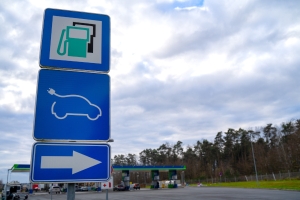Should electric vehicle owners pay an annual fee to offset lost gas tax revenue?

Over the past two years President Biden has championed transportation upgrades, from bridge repairs to electric vehicle tax credits. While federal funds for these initiatives will have a big impact on New Hampshire, they don’t address an underlying problem: New Hampshire relies on the gas tax to fund its transportation infrastructure, and those dollars are slowly dwindling. To help bridge the gap, the New Hampshire Legislature is considering a new fee structure for electric cars.
Declining gas tax revenue for NH roads
While inflation is pushing up the price of everything from eggs to airfares, New Hampshire government isn’t seeing more revenue from the gas tax. There are two reasons for this. First, the gas tax is fixed at just over 22-cents per gallon rather than a percentage of the price. Even if gas shoots up to five dollars a gallon, the state still only gets 22-cents. Second, consumers are purchasing more fuel-efficient vehicles, including plug-in hybrid and electric cars, so they are purchasing less gas overall.
For over a decade the New Hampshire Department of Transportation has warned legislators that the gas tax is not providing sustainable funding for our highways, roads, and bridges. Legislators in turn have considered many alternatives, from a toll surcharge for electric vehicles to an annual “road usage fee,” based on a driver’s annual mileage and/or a vehicle’s miles per gallon. Each of these proposals have had supporters from both parties, but never enough to pass both the House and Senate.
A proposal for electric vehicles
This year momentum is gathering around SB 191. That bill would establish a flat $100 annual fee for electric and plug-in hybrid electric vehicles, paid as a surcharge on annual registration. SB 191 passed the Senate on a voice vote – indicating broad support – and now moves to the House of Representatives.
The Department of Transportation estimates SB 191 would generate around $800,000 in new revenue for New Hampshire to spend on roads, highways, bridges, or other transportation projects each year. To put that number in context, budget writers expect the gas tax to generate around $125 million a year over the next couple years.
The bill also says the Department of Transportation could spend up to 20% of the revenue from this new electric vehicle fee on electric vehicle service equipment.
Support, opposition for a new electric vehicle fee
Supporters of SB 191 argue the bill will benefit all New Hampshire drivers by providing a new, more sustainable funding source for roads. At the public hearing for SB 191, many speakers argued that it is time for electric vehicle owners to pay their “fair share” of road maintenance, since they don’t contribute through the gas tax.
Supporters of SB 191 also note this bill will benefit electric vehicle owners, in particular, since funds can be used to expand electric vehicle infrastructure in the state. New Hampshire has far fewer electric vehicle charging stations than neighboring Maine, Massachusetts, and Vermont.
However, the New Hampshire Department of Transportation is already expecting a large chunk of change from the federal government over the next few years – including millions for electric vehicle service equipment, in particular.
While SB 191 sailed through the New Hampshire Senate, there may be skeptics in the House of Representatives. Some Democrats have opposed similar proposals in the past because they don’t want to discourage electric vehicle purchases with a new fee. Republicans have also voted against similar bills because they are skeptical of any new taxes or fees.
Next steps
The next step for SB 191 is a public hearing in the House of Representatives, although the date is not yet set. If you have an opinion on SB 191, reach out to your state representative. You can find who represents you on our Elected Officials page.
Update: Legislators included a new annual fee for electric vehicles in the 2024-2025 state budget.











Comments
Login or register to post comments